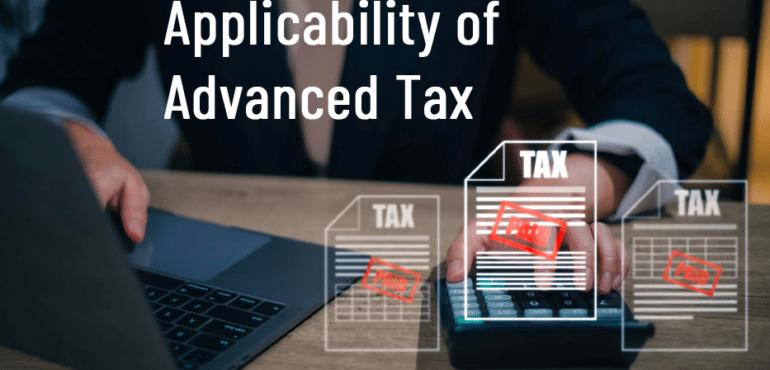Applicability of Advance Tax
Advance tax, a vital aspect of income tax compliance, ensures that taxpayers stay on track with their tax liabilities throughout the financial year. Here, we delve into the intricacies of advance tax, including who needs to pay it, how to calculate it, and the consequences of non-compliance.
What is Advance Tax?
Advance tax refers to paying income tax in instalments throughout the financial year rather than in a lump sum at year-end. This system ensures that taxpayers meet their tax obligations as they earn income, avoiding last-minute financial burdens.
Who Should Pay Advance Tax?
- Salaried Individuals, Freelancers, and Businesses:
If your total tax liability for the year amounts to Rs 10,000 or more, you are required to pay advance tax.
- Senior Citizens:
Individuals aged 60 years or older who do not operate a business are exempt from advance tax, except if they earn business income.
- Taxpayers under Presumptive Taxation Scheme:
Those under sections 44AD (businesses) and 44ADA (professionals) must pay their entire advance tax liability in one instalment by the specified due date.
Advance Tax Due Dates for FY 2024-25:
- June 15: Pay 15% of advance tax
- September 15: Pay 45% of advance tax (subtracting previous payments)
- December 15: Pay 75% of advance tax (subtracting previous payments)
- March 15: Pay 100% of advance tax (subtracting previous payments)
How to Pay Advance Tax Online?
- Visit the e-filing portal of the Income Tax Department.
- Authenticate using PAN and mobile number.
- Select ‘Income Tax’ under the payment category.
- Enter tax details, choose payment method, and bank.
- Preview and pay the tax, keeping the receipt for future reference.
Interest on Late Payment of Advance Tax
Interest is levied under sections 234B and 234C for non-payment or delayed payment of advance tax. Rates and periods vary based on the due date and percentage of tax paid.
All in all…
Advance tax is a proactive approach to fulfilling tax obligations, preventing last-minute hassles and penalties. Understanding its calculation and payment process can help taxpayers manage their finances efficiently and stay compliant with tax laws.
By adhering to advance tax requirements, individuals and businesses can maintain financial discipline and contribute to the smooth functioning of the taxation system.
If you are a taxpayer and require assistance fulfilling your advance tax obligations, reach out to us.
